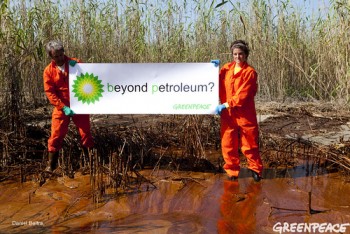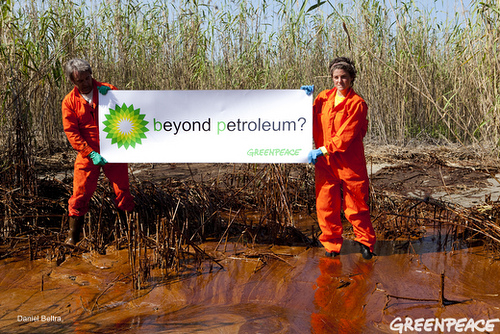 I generally don’t write much about big business, but in light of the implosion of BP’s “green” oil company image — it’s looking more Exxon than eco these days — I went to a dinner Monday night in San Francisco attended by dozens of Fortune 500 executives committed to corporate sustainability. (There were reportedly a few BP execs in the audience, but not surprisingly they kept a low profile.)
I generally don’t write much about big business, but in light of the implosion of BP’s “green” oil company image — it’s looking more Exxon than eco these days — I went to a dinner Monday night in San Francisco attended by dozens of Fortune 500 executives committed to corporate sustainability. (There were reportedly a few BP execs in the audience, but not surprisingly they kept a low profile.)
The occasion was the Corporate Eco Forum, an organization that brings together multinationals ranging from AT&T to Yahoo to hash out strategies for sustainable business. Attendees gathered at the Asian Art Museum to present an award to Wal-Mart Brazil’s chief executive for the company’s efforts to stop the illegal logging of the Amazon rainforest. More on that later. Usually at these events, one can expect a fair amount of feel-good cheerleading among the corporate tribe. But most of the speakers on Monday were more gently chastising than congratulatory.
“Being British here, I speak sensitively at the moment as I only have to turn on an American channel to see a British brand struggling with public resonance,” said Lord Michael Hastings, global head of citizenship and diversity for KPMG International, the giant consulting firm. “The reality is that such exceptional deepwater drilling only comes about, in the words of President Obama in a speech last week in Phoenix, . . . because of America’s desperation to continue the fight for fossil fuels. And we have to face the fact that we [take] heavy risks with the natural environment, with the sustainability of our planet and the reality actually of water ecosystems, which are now so significantly threatened by the oil spill because we have lifestyles that necessitate extreme exploration.”
He added: “We have to actually face the responsibility of the lifestyles we’ve chosen and be ready to change them.”
Hastings said the oil spill underscores how water shortages as much as peak oil will be a defining challenge of the 21st century. He talked about attending a recent event at a hotel in China where bottled water from France was on offer.
“Come on, let’s just stop this,” he said to an audience that included executives from Coca-Cola. “There are thousands of children and adults that simply have no access to clean water. And if we think this pressure on oil is giving us hassle and stress, it’s nothing like the water issues that will drive us to fight one another, to argue with one another, and to war with one another as we’ve never done before.”
 Wal-Mart Brazil’s chief executive, Héctor Núñez.Mindy Lubber, president of Ceres, an organization that works on corporate sustainability issues, told the executives that on a scale of 1 to 100, even the most enlightened big companies rate only a 7 or 8 in their efforts to green up operations. She did note that Wal-Mart Brazil was pushing ahead. The company last year pledged not to sell products sourced from illegal logging of the Amazon and obtained agreements from companies in its supply chain to take action to protect the rainforest.
Wal-Mart Brazil’s chief executive, Héctor Núñez.Mindy Lubber, president of Ceres, an organization that works on corporate sustainability issues, told the executives that on a scale of 1 to 100, even the most enlightened big companies rate only a 7 or 8 in their efforts to green up operations. She did note that Wal-Mart Brazil was pushing ahead. The company last year pledged not to sell products sourced from illegal logging of the Amazon and obtained agreements from companies in its supply chain to take action to protect the rainforest.
When Wal-Mart Brazil’s chief executive, Héctor Núñez, took the stage to receive his award he sounded more Greenpeace than Wall Street. “The environmental situation of Brazil, the planet, is not sustainable,” he said. “As you know, there’s a real chance that the planet’s temperature will increase two to three degrees by 2050. Think of the direct financial impact of global warming on the environment and human health. … Consumers will demand social and environmental action.”
The conundrum, of course, for all these companies and their customers is how to create a sustainable business model and a sustainable planet in a global economy that relies on ever-increasing consumption to fuel prosperity.



